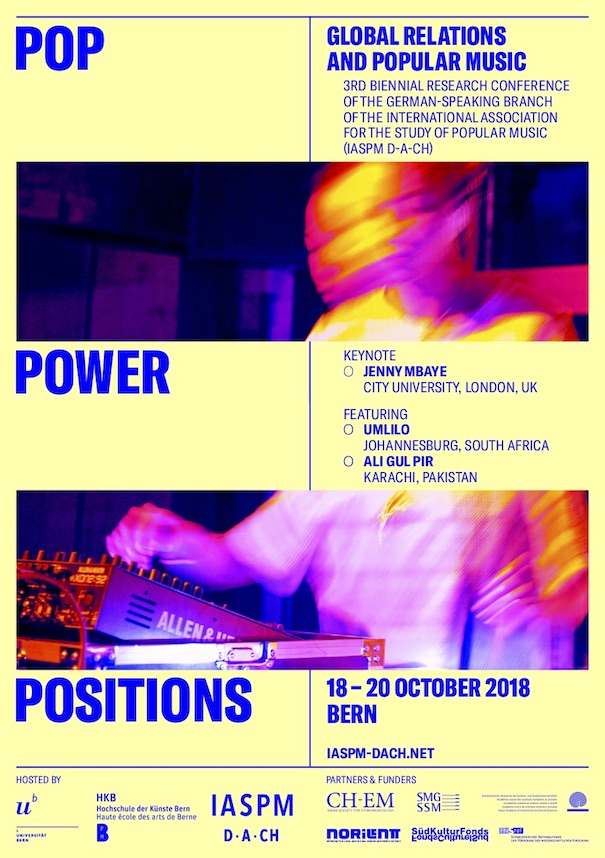ANNUAL CONFERENCE OF THE BRANCH OF THE INTERNATIONAL ASSOCIATION
FOR THE STUDY OF POPULAR MUSIC (IASPM D-A-CH)
Universität Bern und Hochschule der Künste Bern
Partner: Norient – Network for Local and Global Sounds and Media
We will do a panel at the conference: Club Cultures between difference, representation and cosmopolitism (Club Cultures zwischen Differenz, Repräsentation und Kosmopolitismus)
Stefanie Alisch (Berlin): Kuduro, Tarraxo, Afrohouse – Postcolonial Schizophonia in Luanda, Lissabon und
der Welt?
Bianca Ludewig (Vienna): Festivals und Szenen experimenteller elektronischer Musik in Europa: aktuelle Diskurse und Debatten zu Differenz und Machtverhältnissen
Dahlia Borsche (Berlin): Nationale Identitäten in elektronischer Tanzmusik. Mexiko und Südafrika im Vergleich
General Info: With the topic of this conference, we aim to focus popular music studies on global interrelations and power dynamics inherent in the making, performance, distribution, and (re-)presentation of all forms of popular music. The papers promise to give important insights on various aspects of this crucial field of research. We are convinced that by tackling these issues in more detail, and by paying more attention to extant imbalances and inequalities, we can contribute to a better understanding of popular music-making and listening in our globally connected, but still very much neocolonial world.
Keynote: Dr Jenny Fatou Mbaye (City University London)
It was very important to us to widen our focus beyond the borders of academia and beyond our European viewpoint. In collaboration with Norient we therefore invited two artists who experience and engage with the aforementioned matters directly in their music. We are delighted to welcome Umlilo from South Africa
and Ali Gul Pir from Pakistan at our conference. They will be present throughout the conference and will also offer a short artistic intervention in response to the conference topic (Umlilo on Friday and Ali Gul Pir on Saturday).
Norient will create conference report in the format of a podcast.
fb event: https://www.facebook.com/events/237676773660361/
More about the theme/ issues:
In Nigeria, the high pressure to follow the copyright rules of the globalized pop music market restrains the use of samples in hip hop culture. In Egypt, young musicians have no credit cards, leaving them without access to the online music market. In Europe, second and third generation migrants discuss their non-European backgrounds and European identities in songs and tracks. And U.S.-produced Korean pop music (K-Pop) increasingly rivals Korean-produced K-Pop in its concern for authentic presentation.
Issues of power, position, access, and representation have shaped the production, distribution, and reception of popular music and continue to do so today. The three-day interdisciplinary conference Pop – Power – Positions highlights popular music’s embeddedness in a global world. It seeks to uncover and scrutinize the risks, challenges, and potentials of power structures, positioning, and (re)presentations in popular music. The analysis of global, postcolonial structures plays a central role in this endeavour. To date, however, music – and popular music in particular – has only rarely been studied using postcolonial perspectives.
Postcolonialism refers not only to the historical fact of colonialism and its political, geographical, cultural, and economic impact on the countries and regions involved. Rather, postcolonial studies deal with all aspects of cultural diversity, ethnic and cultural difference, and their related power structures. Colonialism as well as postcolonialism refer to hierarchies that are enacted and produced through the construction of the Other and bring about and enforce debateable concepts of representation such as gender, race, ethnic group, nation, class, and culture. In this regard, the effects of (post)colonialism can be detected not only in former colonialized and colonising countries and regions, but also in those which at first sight do not have a colonial heritage, for example Switzerland. From its beginnings, popular music has been produced and performed in and within (post)colonial (power) structures. Postcolonial traces are, according to Johannes Ismaiel-Wendt, inherent in any popular music (2011). Current productions of popular music in different countries show that (post)colonial conditions live on in popular music, especially in a globalised world, and that musicians as well as recipients react in various ways to this situation.
The conference focuses on (global) power relations and representations of race, cultural difference, ethnicity, gender, class, and nation, including the changes and subversive strategies these may involve.








